SZOXP v Minister: De Facto Relationships and Partner Visa Applications
VerifiedAdded on 2021/04/17
|7
|1684
|64
Report
AI Summary
This report examines the legal definition of a de facto relationship under the Australian Migration Act 1958 (Cth) and its implications for partner visa applications. It analyzes the phrase “do not live separately and apart on a permanent basis” as outlined in section 5BC (2)(c)(ii) of the Act, clarifying that cohabitation is not a mandatory requirement. The report discusses the landmark case of SZOXP v Minister for Immigration and Border Protection, where the Full Court of the Federal Court of Australia ruled that applicants are not required to reside together before applying for a partner visa based on a de facto relationship. The report explores the principles of statutory interpretation used by the court, particularly referencing the Interpretation Act 1901 (Cth) and the case of Taylor v The Owners - Strata Plan No 11564, to demonstrate how the court determined that the legislation does not mandate prior cohabitation. The analysis highlights the significance of this ruling for Registered Migration Agents and individuals seeking partner visas, emphasizing that meeting the requirements of the Act, particularly the genuine and continuing nature of the relationship, is paramount. The report concludes by summarizing the key findings and their practical implications for visa applicants and legal practitioners involved in migration law.
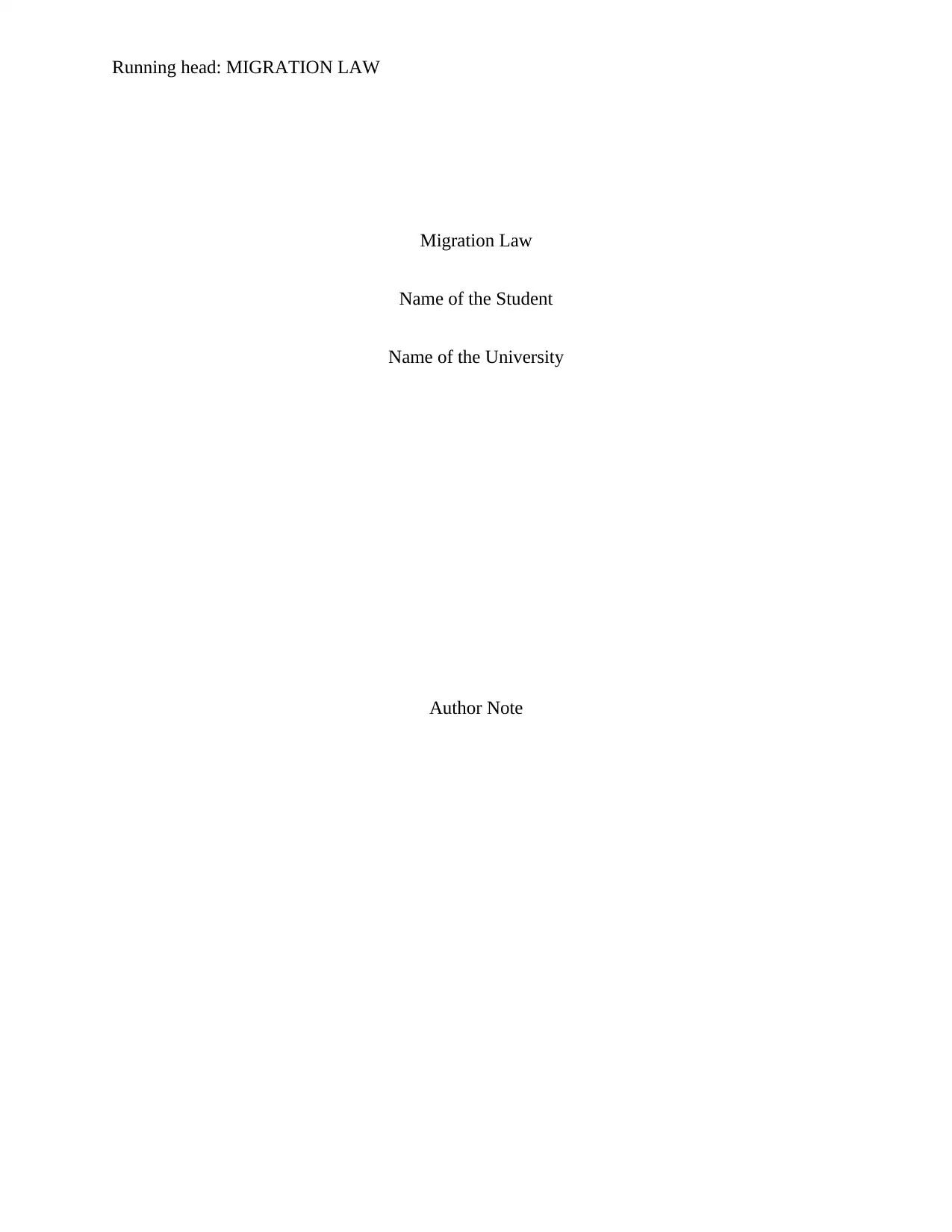
Running head: MIGRATION LAW
Migration Law
Name of the Student
Name of the University
Author Note
Migration Law
Name of the Student
Name of the University
Author Note
Paraphrase This Document
Need a fresh take? Get an instant paraphrase of this document with our AI Paraphraser
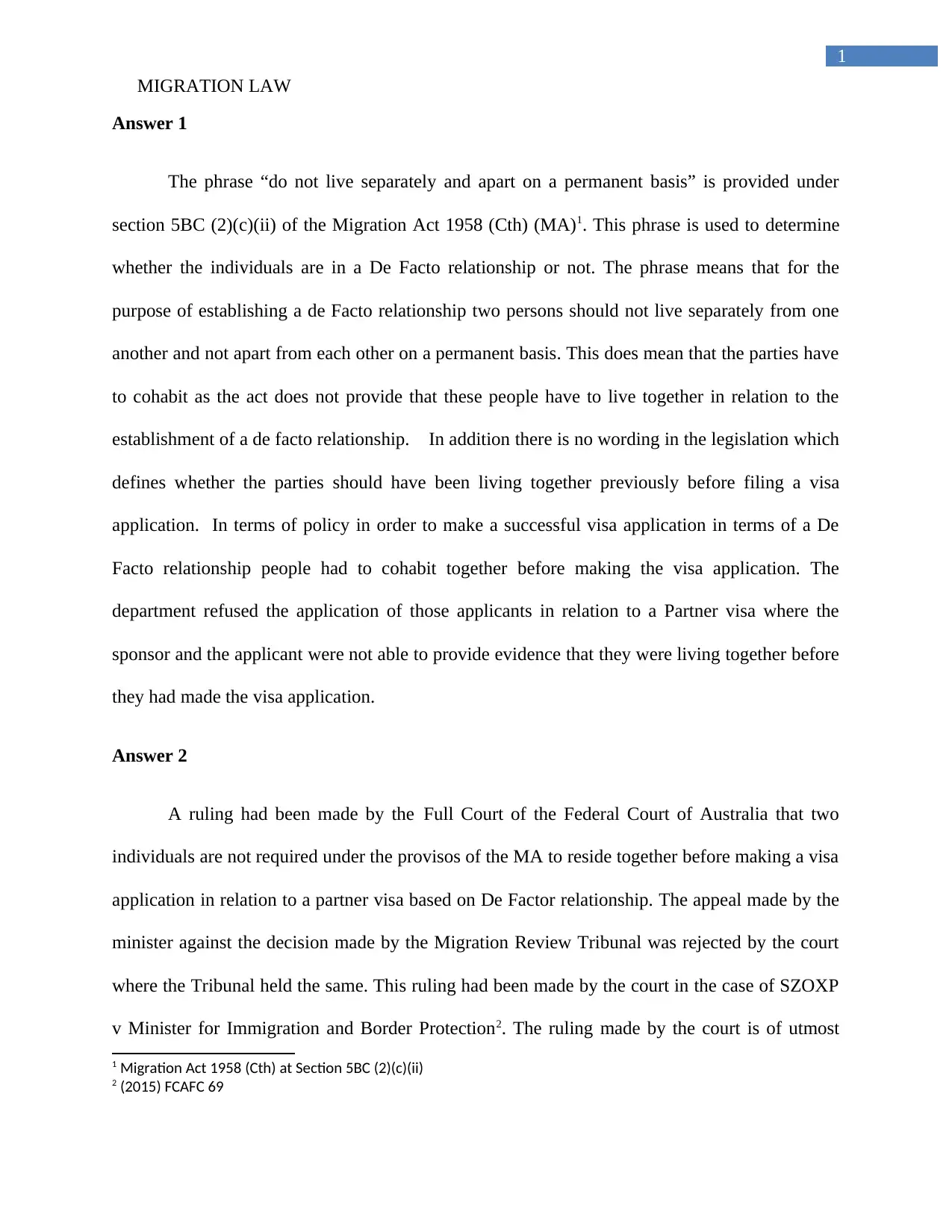
1
MIGRATION LAW
Answer 1
The phrase “do not live separately and apart on a permanent basis” is provided under
section 5BC (2)(c)(ii) of the Migration Act 1958 (Cth) (MA)1. This phrase is used to determine
whether the individuals are in a De Facto relationship or not. The phrase means that for the
purpose of establishing a de Facto relationship two persons should not live separately from one
another and not apart from each other on a permanent basis. This does mean that the parties have
to cohabit as the act does not provide that these people have to live together in relation to the
establishment of a de facto relationship. In addition there is no wording in the legislation which
defines whether the parties should have been living together previously before filing a visa
application. In terms of policy in order to make a successful visa application in terms of a De
Facto relationship people had to cohabit together before making the visa application. The
department refused the application of those applicants in relation to a Partner visa where the
sponsor and the applicant were not able to provide evidence that they were living together before
they had made the visa application.
Answer 2
A ruling had been made by the Full Court of the Federal Court of Australia that two
individuals are not required under the provisos of the MA to reside together before making a visa
application in relation to a partner visa based on De Factor relationship. The appeal made by the
minister against the decision made by the Migration Review Tribunal was rejected by the court
where the Tribunal held the same. This ruling had been made by the court in the case of SZOXP
v Minister for Immigration and Border Protection2. The ruling made by the court is of utmost
1 Migration Act 1958 (Cth) at Section 5BC (2)(c)(ii)
2 (2015) FCAFC 69
MIGRATION LAW
Answer 1
The phrase “do not live separately and apart on a permanent basis” is provided under
section 5BC (2)(c)(ii) of the Migration Act 1958 (Cth) (MA)1. This phrase is used to determine
whether the individuals are in a De Facto relationship or not. The phrase means that for the
purpose of establishing a de Facto relationship two persons should not live separately from one
another and not apart from each other on a permanent basis. This does mean that the parties have
to cohabit as the act does not provide that these people have to live together in relation to the
establishment of a de facto relationship. In addition there is no wording in the legislation which
defines whether the parties should have been living together previously before filing a visa
application. In terms of policy in order to make a successful visa application in terms of a De
Facto relationship people had to cohabit together before making the visa application. The
department refused the application of those applicants in relation to a Partner visa where the
sponsor and the applicant were not able to provide evidence that they were living together before
they had made the visa application.
Answer 2
A ruling had been made by the Full Court of the Federal Court of Australia that two
individuals are not required under the provisos of the MA to reside together before making a visa
application in relation to a partner visa based on De Factor relationship. The appeal made by the
minister against the decision made by the Migration Review Tribunal was rejected by the court
where the Tribunal held the same. This ruling had been made by the court in the case of SZOXP
v Minister for Immigration and Border Protection2. The ruling made by the court is of utmost
1 Migration Act 1958 (Cth) at Section 5BC (2)(c)(ii)
2 (2015) FCAFC 69
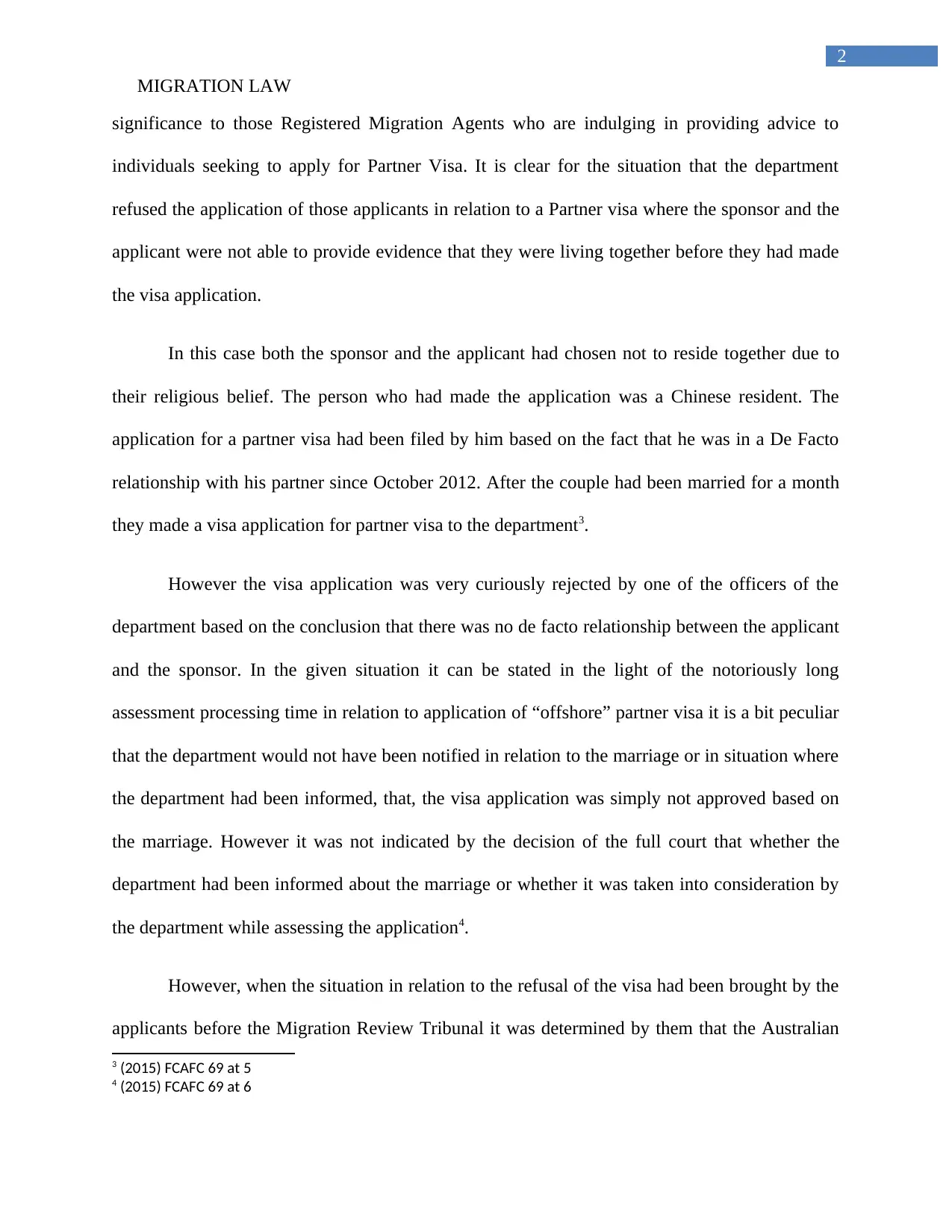
2
MIGRATION LAW
significance to those Registered Migration Agents who are indulging in providing advice to
individuals seeking to apply for Partner Visa. It is clear for the situation that the department
refused the application of those applicants in relation to a Partner visa where the sponsor and the
applicant were not able to provide evidence that they were living together before they had made
the visa application.
In this case both the sponsor and the applicant had chosen not to reside together due to
their religious belief. The person who had made the application was a Chinese resident. The
application for a partner visa had been filed by him based on the fact that he was in a De Facto
relationship with his partner since October 2012. After the couple had been married for a month
they made a visa application for partner visa to the department3.
However the visa application was very curiously rejected by one of the officers of the
department based on the conclusion that there was no de facto relationship between the applicant
and the sponsor. In the given situation it can be stated in the light of the notoriously long
assessment processing time in relation to application of “offshore” partner visa it is a bit peculiar
that the department would not have been notified in relation to the marriage or in situation where
the department had been informed, that, the visa application was simply not approved based on
the marriage. However it was not indicated by the decision of the full court that whether the
department had been informed about the marriage or whether it was taken into consideration by
the department while assessing the application4.
However, when the situation in relation to the refusal of the visa had been brought by the
applicants before the Migration Review Tribunal it was determined by them that the Australian
3 (2015) FCAFC 69 at 5
4 (2015) FCAFC 69 at 6
MIGRATION LAW
significance to those Registered Migration Agents who are indulging in providing advice to
individuals seeking to apply for Partner Visa. It is clear for the situation that the department
refused the application of those applicants in relation to a Partner visa where the sponsor and the
applicant were not able to provide evidence that they were living together before they had made
the visa application.
In this case both the sponsor and the applicant had chosen not to reside together due to
their religious belief. The person who had made the application was a Chinese resident. The
application for a partner visa had been filed by him based on the fact that he was in a De Facto
relationship with his partner since October 2012. After the couple had been married for a month
they made a visa application for partner visa to the department3.
However the visa application was very curiously rejected by one of the officers of the
department based on the conclusion that there was no de facto relationship between the applicant
and the sponsor. In the given situation it can be stated in the light of the notoriously long
assessment processing time in relation to application of “offshore” partner visa it is a bit peculiar
that the department would not have been notified in relation to the marriage or in situation where
the department had been informed, that, the visa application was simply not approved based on
the marriage. However it was not indicated by the decision of the full court that whether the
department had been informed about the marriage or whether it was taken into consideration by
the department while assessing the application4.
However, when the situation in relation to the refusal of the visa had been brought by the
applicants before the Migration Review Tribunal it was determined by them that the Australian
3 (2015) FCAFC 69 at 5
4 (2015) FCAFC 69 at 6
⊘ This is a preview!⊘
Do you want full access?
Subscribe today to unlock all pages.

Trusted by 1+ million students worldwide
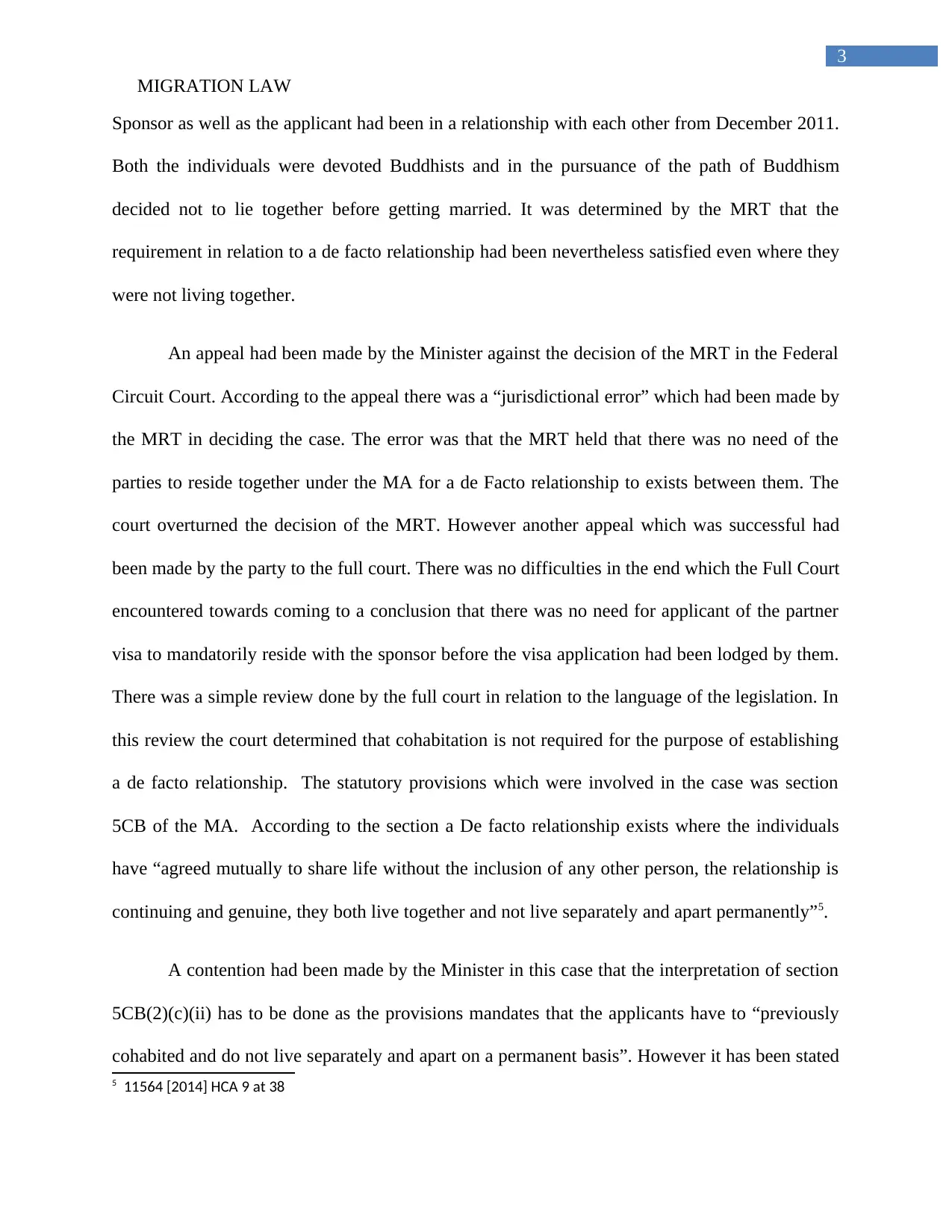
3
MIGRATION LAW
Sponsor as well as the applicant had been in a relationship with each other from December 2011.
Both the individuals were devoted Buddhists and in the pursuance of the path of Buddhism
decided not to lie together before getting married. It was determined by the MRT that the
requirement in relation to a de facto relationship had been nevertheless satisfied even where they
were not living together.
An appeal had been made by the Minister against the decision of the MRT in the Federal
Circuit Court. According to the appeal there was a “jurisdictional error” which had been made by
the MRT in deciding the case. The error was that the MRT held that there was no need of the
parties to reside together under the MA for a de Facto relationship to exists between them. The
court overturned the decision of the MRT. However another appeal which was successful had
been made by the party to the full court. There was no difficulties in the end which the Full Court
encountered towards coming to a conclusion that there was no need for applicant of the partner
visa to mandatorily reside with the sponsor before the visa application had been lodged by them.
There was a simple review done by the full court in relation to the language of the legislation. In
this review the court determined that cohabitation is not required for the purpose of establishing
a de facto relationship. The statutory provisions which were involved in the case was section
5CB of the MA. According to the section a De facto relationship exists where the individuals
have “agreed mutually to share life without the inclusion of any other person, the relationship is
continuing and genuine, they both live together and not live separately and apart permanently”5.
A contention had been made by the Minister in this case that the interpretation of section
5CB(2)(c)(ii) has to be done as the provisions mandates that the applicants have to “previously
cohabited and do not live separately and apart on a permanent basis”. However it has been stated
5 11564 [2014] HCA 9 at 38
MIGRATION LAW
Sponsor as well as the applicant had been in a relationship with each other from December 2011.
Both the individuals were devoted Buddhists and in the pursuance of the path of Buddhism
decided not to lie together before getting married. It was determined by the MRT that the
requirement in relation to a de facto relationship had been nevertheless satisfied even where they
were not living together.
An appeal had been made by the Minister against the decision of the MRT in the Federal
Circuit Court. According to the appeal there was a “jurisdictional error” which had been made by
the MRT in deciding the case. The error was that the MRT held that there was no need of the
parties to reside together under the MA for a de Facto relationship to exists between them. The
court overturned the decision of the MRT. However another appeal which was successful had
been made by the party to the full court. There was no difficulties in the end which the Full Court
encountered towards coming to a conclusion that there was no need for applicant of the partner
visa to mandatorily reside with the sponsor before the visa application had been lodged by them.
There was a simple review done by the full court in relation to the language of the legislation. In
this review the court determined that cohabitation is not required for the purpose of establishing
a de facto relationship. The statutory provisions which were involved in the case was section
5CB of the MA. According to the section a De facto relationship exists where the individuals
have “agreed mutually to share life without the inclusion of any other person, the relationship is
continuing and genuine, they both live together and not live separately and apart permanently”5.
A contention had been made by the Minister in this case that the interpretation of section
5CB(2)(c)(ii) has to be done as the provisions mandates that the applicants have to “previously
cohabited and do not live separately and apart on a permanent basis”. However it has been stated
5 11564 [2014] HCA 9 at 38
Paraphrase This Document
Need a fresh take? Get an instant paraphrase of this document with our AI Paraphraser
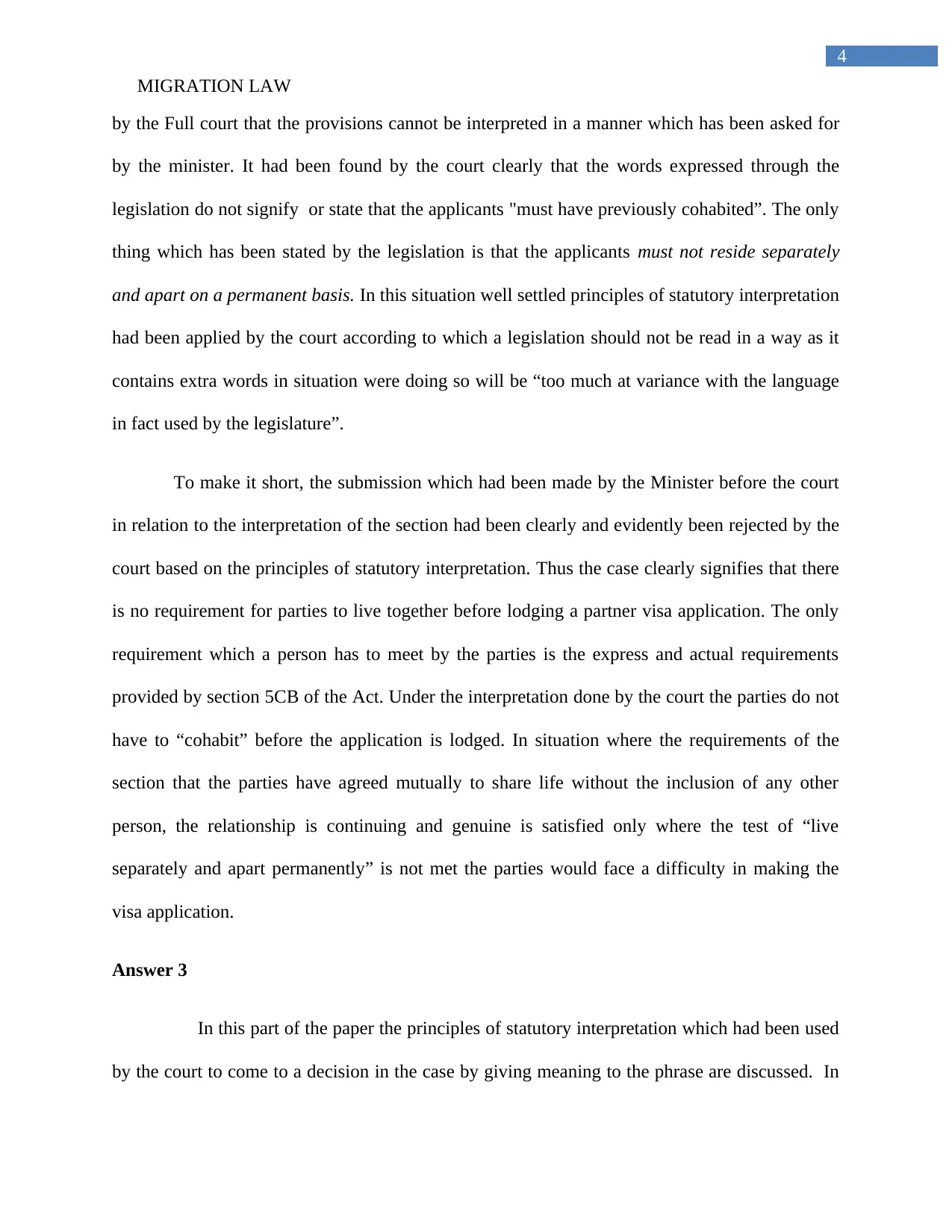
4
MIGRATION LAW
by the Full court that the provisions cannot be interpreted in a manner which has been asked for
by the minister. It had been found by the court clearly that the words expressed through the
legislation do not signify or state that the applicants "must have previously cohabited”. The only
thing which has been stated by the legislation is that the applicants must not reside separately
and apart on a permanent basis. In this situation well settled principles of statutory interpretation
had been applied by the court according to which a legislation should not be read in a way as it
contains extra words in situation were doing so will be “too much at variance with the language
in fact used by the legislature”.
To make it short, the submission which had been made by the Minister before the court
in relation to the interpretation of the section had been clearly and evidently been rejected by the
court based on the principles of statutory interpretation. Thus the case clearly signifies that there
is no requirement for parties to live together before lodging a partner visa application. The only
requirement which a person has to meet by the parties is the express and actual requirements
provided by section 5CB of the Act. Under the interpretation done by the court the parties do not
have to “cohabit” before the application is lodged. In situation where the requirements of the
section that the parties have agreed mutually to share life without the inclusion of any other
person, the relationship is continuing and genuine is satisfied only where the test of “live
separately and apart permanently” is not met the parties would face a difficulty in making the
visa application.
Answer 3
In this part of the paper the principles of statutory interpretation which had been used
by the court to come to a decision in the case by giving meaning to the phrase are discussed. In
MIGRATION LAW
by the Full court that the provisions cannot be interpreted in a manner which has been asked for
by the minister. It had been found by the court clearly that the words expressed through the
legislation do not signify or state that the applicants "must have previously cohabited”. The only
thing which has been stated by the legislation is that the applicants must not reside separately
and apart on a permanent basis. In this situation well settled principles of statutory interpretation
had been applied by the court according to which a legislation should not be read in a way as it
contains extra words in situation were doing so will be “too much at variance with the language
in fact used by the legislature”.
To make it short, the submission which had been made by the Minister before the court
in relation to the interpretation of the section had been clearly and evidently been rejected by the
court based on the principles of statutory interpretation. Thus the case clearly signifies that there
is no requirement for parties to live together before lodging a partner visa application. The only
requirement which a person has to meet by the parties is the express and actual requirements
provided by section 5CB of the Act. Under the interpretation done by the court the parties do not
have to “cohabit” before the application is lodged. In situation where the requirements of the
section that the parties have agreed mutually to share life without the inclusion of any other
person, the relationship is continuing and genuine is satisfied only where the test of “live
separately and apart permanently” is not met the parties would face a difficulty in making the
visa application.
Answer 3
In this part of the paper the principles of statutory interpretation which had been used
by the court to come to a decision in the case by giving meaning to the phrase are discussed. In
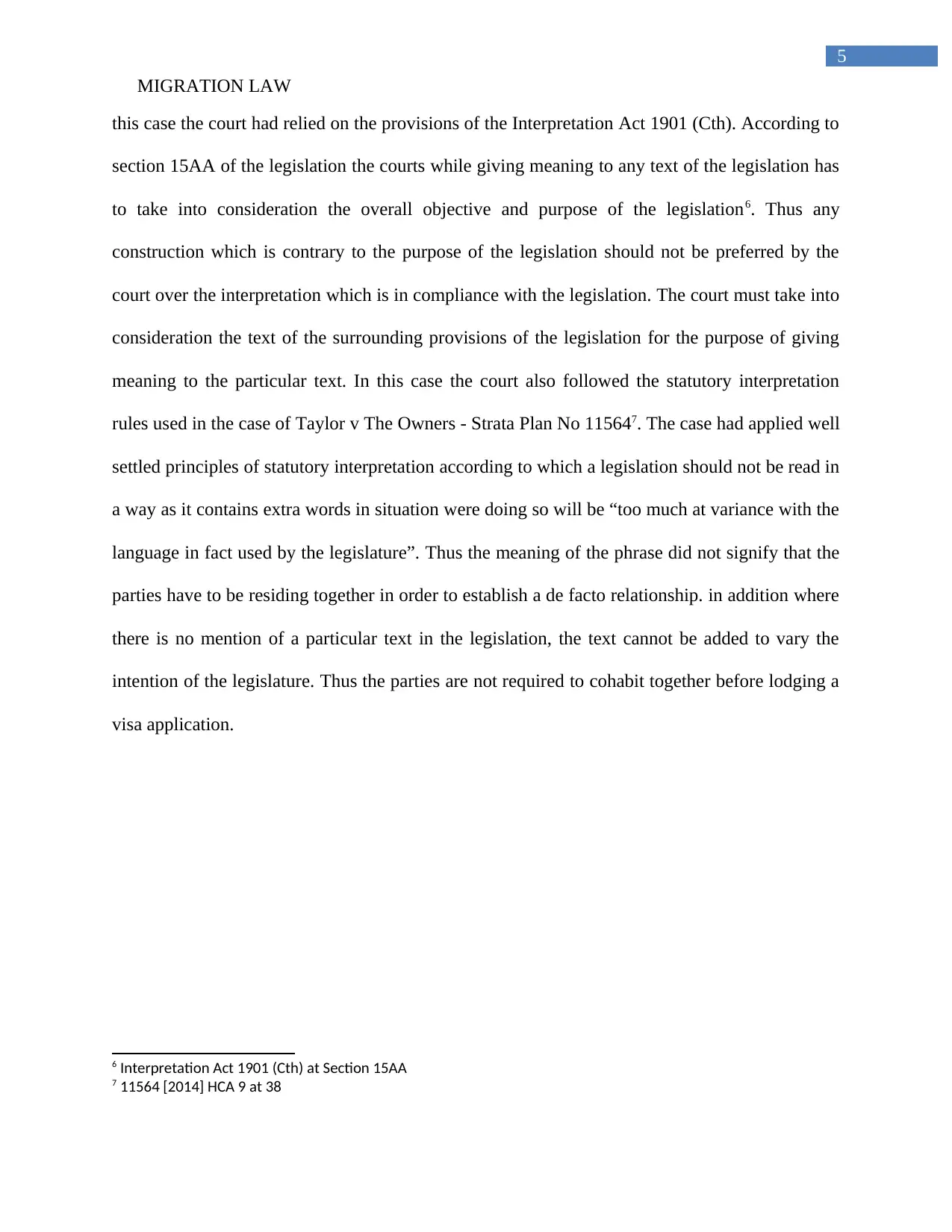
5
MIGRATION LAW
this case the court had relied on the provisions of the Interpretation Act 1901 (Cth). According to
section 15AA of the legislation the courts while giving meaning to any text of the legislation has
to take into consideration the overall objective and purpose of the legislation6. Thus any
construction which is contrary to the purpose of the legislation should not be preferred by the
court over the interpretation which is in compliance with the legislation. The court must take into
consideration the text of the surrounding provisions of the legislation for the purpose of giving
meaning to the particular text. In this case the court also followed the statutory interpretation
rules used in the case of Taylor v The Owners - Strata Plan No 115647. The case had applied well
settled principles of statutory interpretation according to which a legislation should not be read in
a way as it contains extra words in situation were doing so will be “too much at variance with the
language in fact used by the legislature”. Thus the meaning of the phrase did not signify that the
parties have to be residing together in order to establish a de facto relationship. in addition where
there is no mention of a particular text in the legislation, the text cannot be added to vary the
intention of the legislature. Thus the parties are not required to cohabit together before lodging a
visa application.
6 Interpretation Act 1901 (Cth) at Section 15AA
7 11564 [2014] HCA 9 at 38
MIGRATION LAW
this case the court had relied on the provisions of the Interpretation Act 1901 (Cth). According to
section 15AA of the legislation the courts while giving meaning to any text of the legislation has
to take into consideration the overall objective and purpose of the legislation6. Thus any
construction which is contrary to the purpose of the legislation should not be preferred by the
court over the interpretation which is in compliance with the legislation. The court must take into
consideration the text of the surrounding provisions of the legislation for the purpose of giving
meaning to the particular text. In this case the court also followed the statutory interpretation
rules used in the case of Taylor v The Owners - Strata Plan No 115647. The case had applied well
settled principles of statutory interpretation according to which a legislation should not be read in
a way as it contains extra words in situation were doing so will be “too much at variance with the
language in fact used by the legislature”. Thus the meaning of the phrase did not signify that the
parties have to be residing together in order to establish a de facto relationship. in addition where
there is no mention of a particular text in the legislation, the text cannot be added to vary the
intention of the legislature. Thus the parties are not required to cohabit together before lodging a
visa application.
6 Interpretation Act 1901 (Cth) at Section 15AA
7 11564 [2014] HCA 9 at 38
⊘ This is a preview!⊘
Do you want full access?
Subscribe today to unlock all pages.

Trusted by 1+ million students worldwide
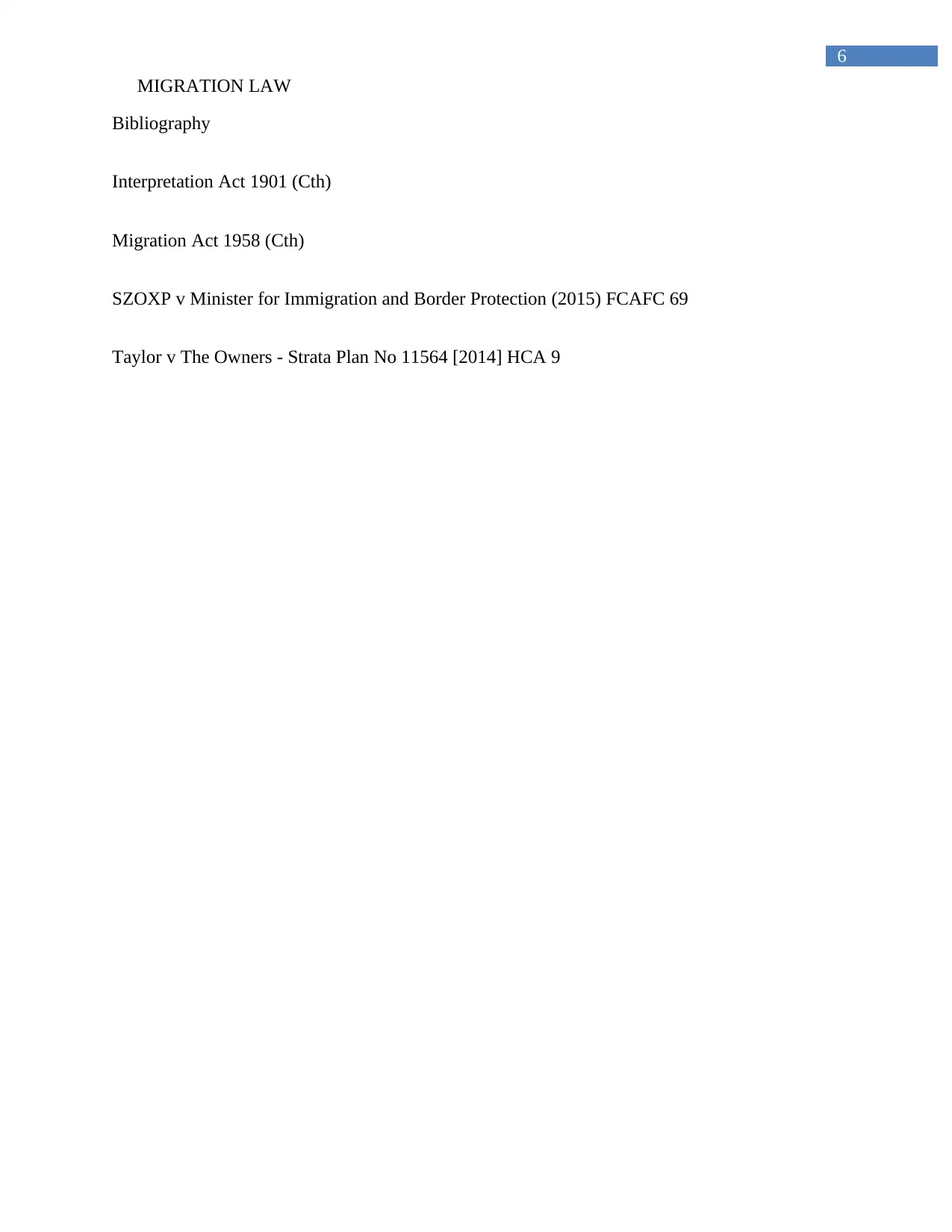
6
MIGRATION LAW
Bibliography
Interpretation Act 1901 (Cth)
Migration Act 1958 (Cth)
SZOXP v Minister for Immigration and Border Protection (2015) FCAFC 69
Taylor v The Owners - Strata Plan No 11564 [2014] HCA 9
MIGRATION LAW
Bibliography
Interpretation Act 1901 (Cth)
Migration Act 1958 (Cth)
SZOXP v Minister for Immigration and Border Protection (2015) FCAFC 69
Taylor v The Owners - Strata Plan No 11564 [2014] HCA 9
1 out of 7
Related Documents
Your All-in-One AI-Powered Toolkit for Academic Success.
+13062052269
info@desklib.com
Available 24*7 on WhatsApp / Email
![[object Object]](/_next/static/media/star-bottom.7253800d.svg)
Unlock your academic potential
Copyright © 2020–2026 A2Z Services. All Rights Reserved. Developed and managed by ZUCOL.




